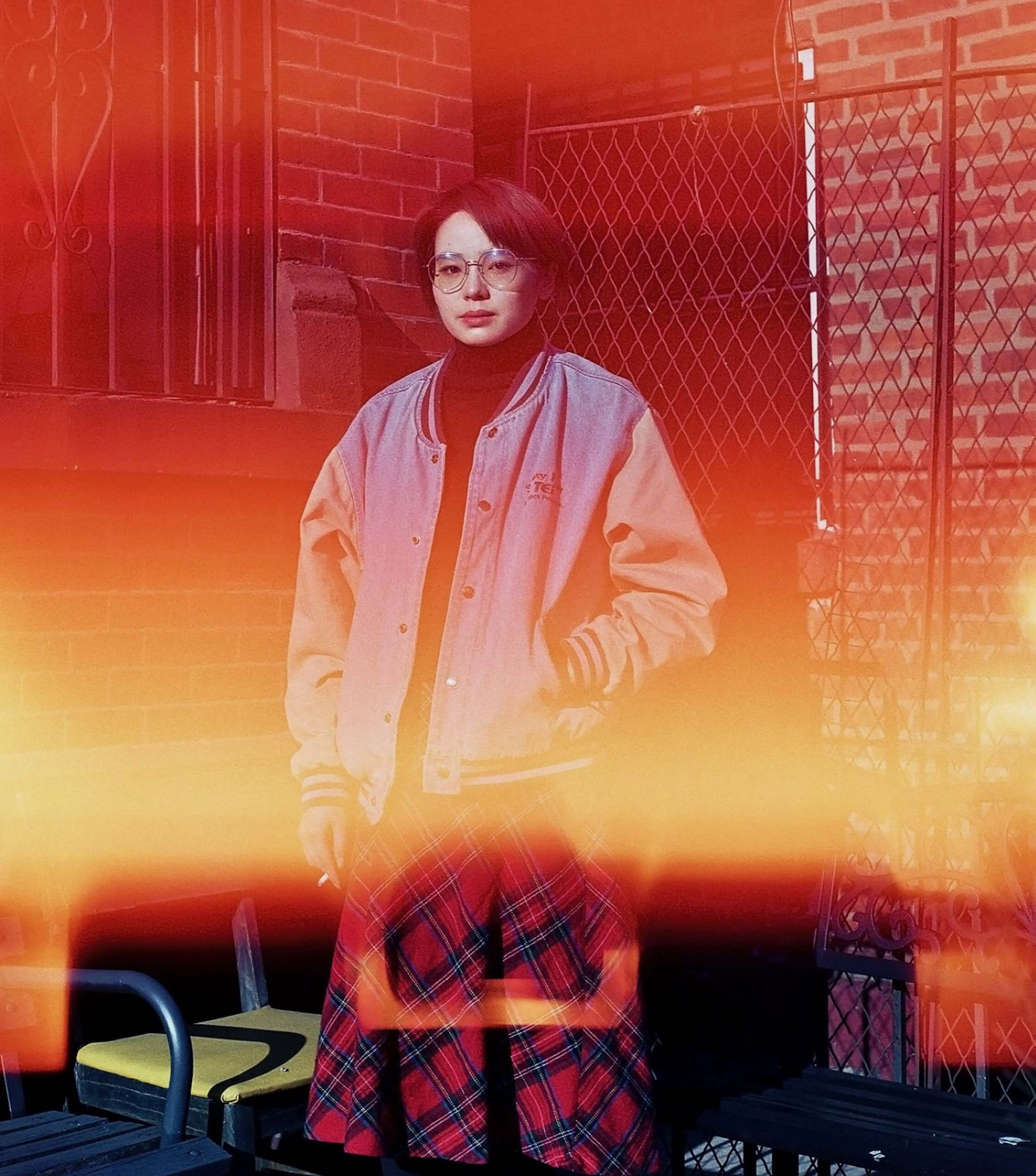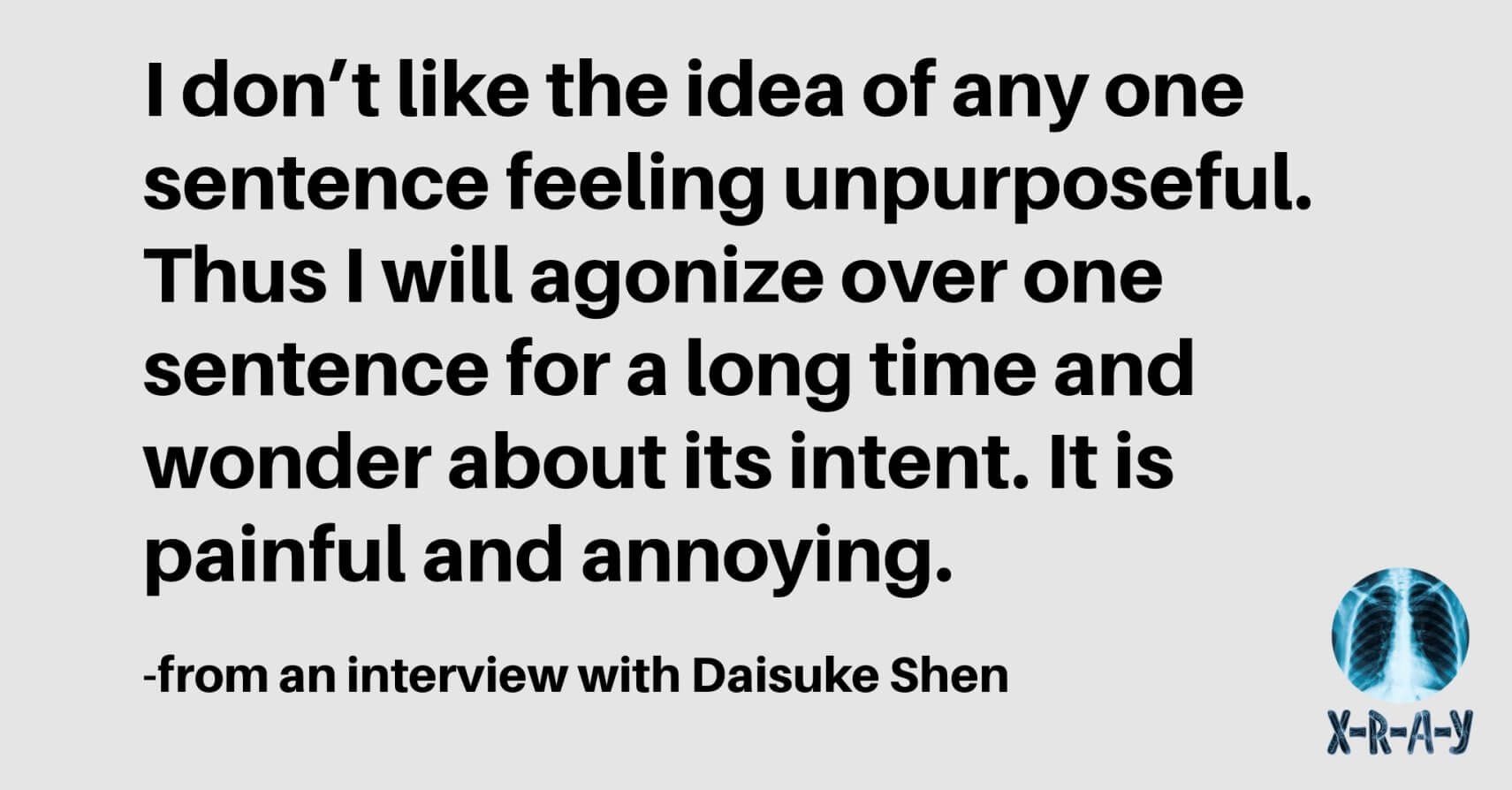The burden of foresight. With Vague Predictions & Prophecies (CLASH Books, 2024) Daisuke Shen mainlines a generation’s insecurities into fiction that is at once ephemeral and psychically probing. These are stories that present longing, whether that be for a sense of solidity, a chance at connection, or a reprieve from aimlessness. Daydreams of lost days and nightmares of days lost. Shen explores how technology melds with the human, and speculates on where consciousness might reside. I spoke with Daisuke about the book.

Rebecca Gransden: The book shares its title with one of the short stories you’ve included, “Vague Predictions & Prophecies.” What led you to use this as the title for the collection as a whole?
Daisuke Shen: Almost all of these stories, or at least the ones I can think of off the top of my head, feature characters who are awaiting some kind of inevitable doom, or who are searching for something or someone to save them. In times of extreme desperation and terror there is a tendency to anticipate/fantasize about the best and the worst outcomes; rarely is there ever a gray area. While I think it’s human to look for patterns or systems in order to make sense of the world, you can become narrow-scoped, only seeing the things you want to. You forget that the world isn’t as focused on you as you might think. I do believe that there exists the supernatural or spiritual, whichever you’d like to term it, but I also know that the human mind is good at tricking itself. But figuring out where that line begins and ends is impossible at times.
RG: A mood of ennui and melancholia runs through the collection, with many of your characters unsure of themselves, rudderless or disappointed with life. A sense of yearning pervades the book. When did you write these stories? Do they remind you of a particular time in your life?
DS: All of these stories feel a little distant from me now. The last ones were written around two-three years ago, I think, and are reflective of very difficult times, when I was living day-to-day in fight or flight mode. It’s hard to read some of them, to be quite honest.
It’s interesting that you mention yearning as a constant throughout the collection. Yearning is a safe place for people to be, even while it’s miserable. It provides us with the ability to maintain a fantasy, to protect yourself from the potential disappointment of realizing your desire is misplaced. We romanticize destinations, thinking that when we reach a certain place within our lives or relationships, we’ll be saved. But how many people truly want to reach the finish line, where nothing comes afterward?
There is a healthy kind of yearning, wherein it allows for us to carry forward in life — we call this hope. The unhealthy kind is the one that renders us sedentary, and we call this fantasy. Much of the collection was written with the attitude of the latter.
RG: He wiped the sweat from his nose and looked at us with his granite black eyes, a thin smile spreading across his face. The one he had when he was fighting. I realized in that moment why his momma was so convinced he was a monster. She’d beaten him every night as a kid, trying to get the demons out. The welts on his body were everywhere.
For “The Pasture” you address the idea of rules, the way in which the rules of the adult world and those that are the province of childhood can create friction or contradict one another. For your characters, rules present themselves as situational, whether it be school rules, religious guidance, or the social dynamics of a friend group. There is a sense that the rules on display exist to tentatively combat the invasion of the more chaotic forces that threaten the equilibrium of everyday life, imperfect as it is. How do your characters deal with rules? Do you impose rules upon yourself in your writing life?

DS: Every day, from the time when we wake up to when we go to sleep, we enter into a negotiation with power. Control and order are needed to some degree or else entire systems devolve. And it is human to break rules even as we try to hold to them. Maybe especially when we try to hold onto them stringently, which is how new foundations are created — through disruption and dissolution. In writing I am drawn to restraint, which is why I am drawn to short stories and novellas. You have to be creative when working with a very short amount of pages, and it’s often when your best writing comes out — under pressure. When someone provides me with a restraint/specific form, I like to see how far I can take it, how I can bend it from its original expectations.
I had a lot of external rules imposed on me growing up, which led to this immense terror inside of me of ever messing up or making a mistake. I still have this fear, but not as strongly as I used to. I now know there’s dignity in imperfection though it’s hard to internalize. I think my characters operate much in the same way — terrified of disrupting the order of things but also knowing that transformation is inevitable. This is the only option afforded to us in life.
But apart from the above, my rules for myself in writing tend to be subconscious and uncontrollable. Most of what I’m finding difficult these days is how to recreate the same intensity, movement, and emotion in a long-form work that I would in short stories. I don’t like the idea of any one sentence feeling unpurposeful. Thus I will agonize over one sentence for a long time and wonder about its intent. It is painful and annoying.
RG: I can’t stop staring. Staring, and laughing, and scared. I want to join our consciousnesses, join my body with its, forever. I feel the urge to kill for it. I would do anything it wanted me to.
The story “Vague Predictions & Prophesies” deals with the angelic, a theme that recurs throughout the collection. In this case you make reference to the Binding of Isaac and the archangel connected with the Biblical account. For angels come down to earth, a complicated grounding awaits, where the human element must be taken into account, with its troubles and flaws, and the relationship with God gains new dimensions, sometimes resentful, often with baggage. The angelic can be as terrifying and awe-inspiring as much as it is comforting or guiding. What drew you to explore the figure of the angel, and to the story of Isaac in particular? What is God’s plan for His angels?
DS: I think a lot about the story of Isaac. I was introduced first to the story as a young child in church and Christian school, and it was a rather simplistic sort of explanation that God never meant to kill Isaac and was simply testing Abraham to see if he would prove that his love for him was stronger — Abraham knew that God would never truly make him go through with it. Then I was re-introduced to the story from Kierkegaard’s viewpoint, which is that Abraham both fully accepted the fact of Isaac’s death while at the same time maintaining nonetheless that Isaac would be brought back to him somehow, even as he brings the knife down to perform the act.
It is postulated by some scholars that Zedkiel is the referenced angel who intervenes before Isaac is killed. Zedkiel is the angel of mercy, yet some people mistake mercy for kindness. But I think mercy can also be cruelty and necessarily so — in that it forces people to keep going, which is another kind of suffering altogether. But there is also the hope of a better life.
In the video game Nier: Automata, there is a point in which you learn that everyone in the character Pascal’s village, including the children, have been slaughtered. He begs for you to kill him, after which you are presented with three choices: You can kill him, or take his memories, or walk away. If you choose to take his memories, you come back later and find him selling his dead children’s body parts, as he thinks they’re just machine parts. If you kill him, he thanks you. But if you walk away, he yells out to you that you’ve betrayed him. And you never see him again in the game after that.
I chose to kill him, but a better option in my opinion would have been to walk away and leave him with a weapon.
I am always anticipating the impossible to happen. For some this is termed magical thinking, but I call it faith.
RG: Many of the stories deal with the nature of consciousness and perception. When thinking about theme, what part does exploration of these areas play in your work?
DS: The fact that there are so many different ways to perceive any given situation is something that really messes with me. “Home Video” grapples with this some. A conscious being is one that is afflicted with the terrible awareness of its own existence and its limitations. And if you live through too much, rationality and logical perception can be overtaken by instinct, the necessity of survival. How much do we truly know about ourselves and what keeps us alive? What parts of ourselves do we expose to others that we aren’t fully aware of? People always say they know themselves best but I don’t know how true that is.
But at the same time, you have to build enough mental fortitude so that your general perception, as well as your understanding of who you are, is not easily swayed by anyone who comes along. I am not always great at trusting my own judgment, and neither are my characters.
RG: “Damien and Melissa” explores the potential of technology when applied to human relationships. The story poses many questions, and led me to muse on issues of intrusion and the boundaries it is necessary for us to set for ourselves. When it comes to your work, what areas of technology are you drawn to investigate?
DS: I was not allowed to have boundaries as a child. Technology is not healthy for us in many ways because it encourages a kind of enmeshment, I think, an erosion of the self as we are encouraged to be in constant conversation with others and to absorb as much information as possible in a limited amount of time. Of course it is good to have friends and to learn as much as we can, but how comfortable are we nowadays at being by ourselves for more than a couple of hours? Discipline is lacking nowadays. Strong relationships, becoming an expert in a specific area of study, are things that are built over a very long period of time, with intense concentration. I don’t want to engage with anything or anyone in a shallow way.
Loneliness and the way technology has been created to aid people in their isolation is of great fascination to me. Also the way people use technology to take advantage of others’ loneliness, too. Pig-slaughtering scams, for instance, wherein scammers either text numbers at random or create fake dating profiles on apps, and then slowly begin to drain victims of their money by asking them to invest in cryptocurrency online, then taking it and disappearing forever. There were two stories in the news I remember, which was a guy who worked in cybersecurity for a university and then a woman who worked in finance. Both people were victims of this scam, which seems unbelievable until you learn that both of them had lost their spouses right beforehand. In times of insurmountable grief we can see a trap clear as day and still walk inside of it.
RG: The presence of God recurs in various ways throughout the collection. Whether it be the Abrahamic God, a personal God, or something less concrete is, for the most part, dependent upon how your characters interact with the divine. Do you have a spiritual belief, and if so, how is that reflected in the collection?
DS: I believe to one degree or another in the following: Ghosts; different lives and realities outside of this one; angels; karma; hexes; divine protection; spirits evil and good and neutral; gods; God; messengers; fate; altering the course of fate; some type of afterlife; prophetic dreams. Reincarnation, too, maybe.
RG: It was darker than I’d expected. Shirts fluttered on metal racks, like ghosts without frames. Every time I shined the flashlight into a room, I imagined that now would be when I’d see them: the lovers, their bodies forming into one another’s; a man with a vendetta who would plunge a knife into my back. Humidity clung to my face as I searched for them. But there was never anything but my own shadow, grotesque and overgrown, hunting me through the corridors.
The story “The Rabbit God” features a security guard who is haunted as much by imagined phantoms as he is inner ghosts. Many of your stories deal with the ghosts we carry with us. What is the nature of the ghostly in your work, and how do spirits manifest in Vague Predictions & Prophesies?
DS: In Chinese and Japanese culture ghosts are very real and serious business. So too in the South. They manifest because of the fact they are wronged in life, because their deaths were painful or tragic. There are so many different types of ghosts across cultures, within our bloodlines, inside of the soil. They are reminders that history follows you. The cruelty and destruction of humanity or the human soul is remembered and resistant to our attempts to stifle it.
RG: “Duckling” raises the issue of privacy, and what it is reasonable to share with another. Passwords become a measure of trust, passcodes a signal of access and connection. The story presents a character willing to sacrifice identity and personal autonomy, to relinquish oneself. Many of your stories deal with the nature of the self. How do you approach your work on a philosophical level?
DS: Questions I wrestle with often include how much sacrifice one should make in love. The constitution of a self is primarily one made in relations to others. But a core is so easily suffocated at times. A self is a taught line that is at times pliant. Moldable. Some foundational aspects will remain despite anything else but it’s also silly to think that selves are unmovable objects.
RG: What relationship does the past have to the present in your stories?
DS: The past and the present are in a very codependent situationship in my work. Neither party wants to let go despite knowing it’s not going to work out. It’s decades long at this point and may very well never end.
RG: The story “Machine Translation” addresses themes of appearances, metamorphosis, and the use of technology to deliver fundamental needs, such as the emotional and spiritual. How can data be a measure for life? How do you approach the use of dream logic in your work?
DS: In terms of the things that we buy or watch or eat, the places we go, the people we contact, patterns begin to emerge. Data surveillance is used for really evil purposes, for instance, racial profiling. I don’t think data is a measurement of life. I think that you could probably make some assumptions, or make new ones about me if I told you what I bought at the grocery store today, what my search history is like, who I’ve spoken to on the phone. But it cannot serve as a reflection of a whole human being, can’t replace an actual connection, which is part of why the mother in that story loses her mind — she wants for the world to fit into compact facts in order for her to overcome her past traumas but it won’t stay shut.
RG: How do you view the collection as a whole entity? When looking back, what stands out to you most about writing it?
DS: If I’m being honest? I want it as far away from me as possible. I want to pretend it’s not coming out. But I also want people to know that I did work really hard on these stories. And it took a very long time. And I was unhappy with almost all of the stories after long periods of not hearing back, and I kept wanting to include different ones. I begged my agent to pull it many times. But he believed in my stories.
That’s all to say that if you’re reading this and you want to write a short story collection don’t be fooled by people who give you a formula for success. I often tell my students I am pessimistic about publishing. It makes me sad, to be honest, that there’s such a huge need for writers to become businesspeople nowadays. I am just not good at it, and I don’t think it comes naturally to artists. We are committed to our work most of all and that’s how it should be, not spent having to sell ourselves on whatever platform it might be. But I also tell them there are presses that will love your work and take good care of it. Long story short if you have a story inside of you, get it out. You owe it to yourself.

